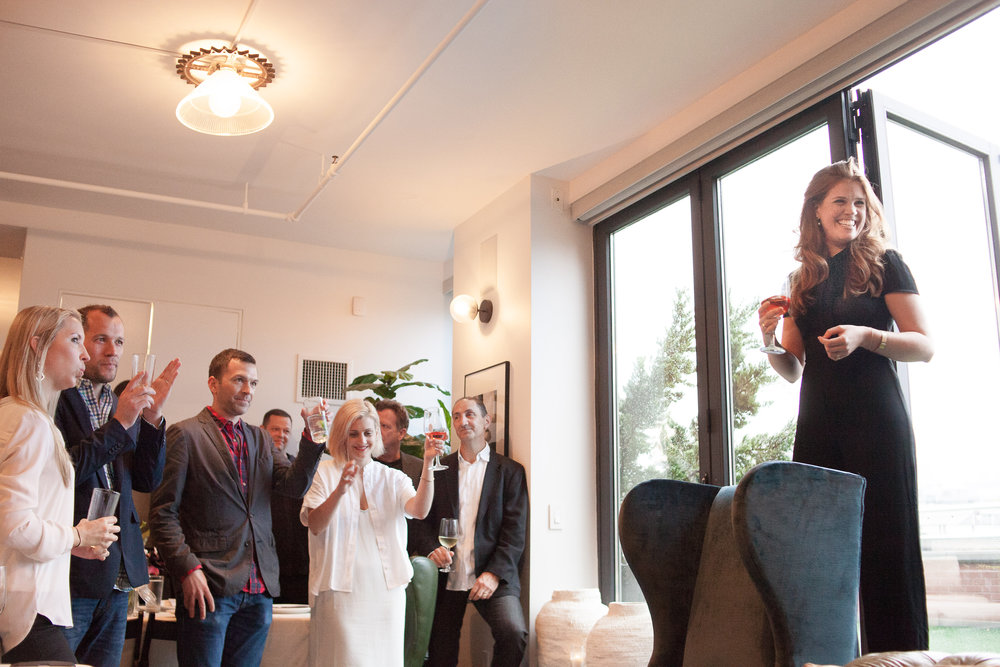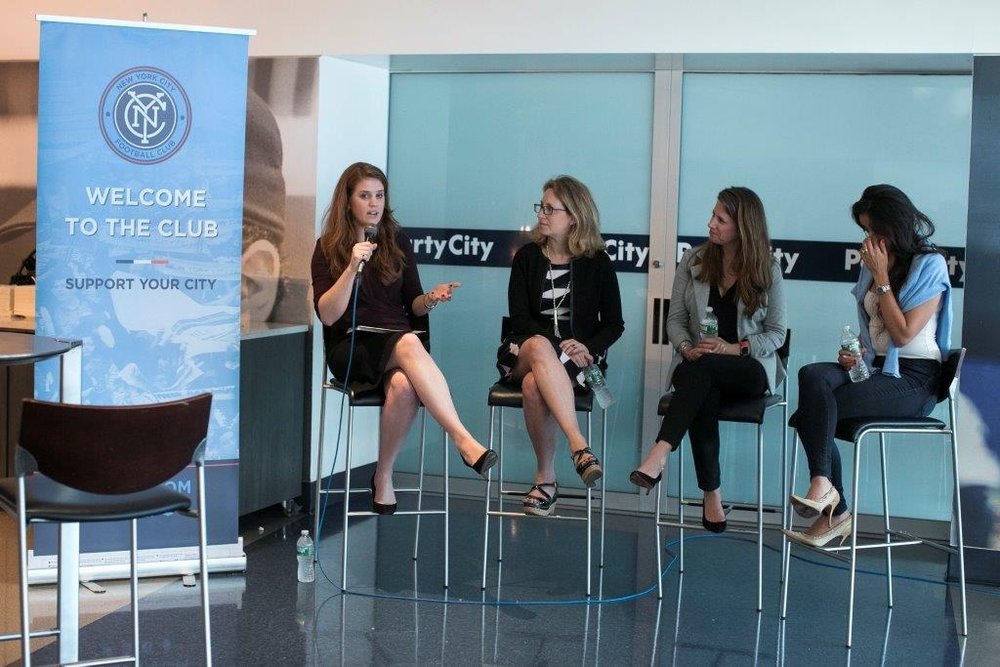While Silicon Valley startups were forced to get by with less in 2016—investments in new companies fell 25 percent from a year ago—the boom in NYC’s Silicon Alley is showing no signs of slowing down. We got to sit down with Heather Hartnett, CEO and founding partner of Human Ventures, an NYC startup studio that is taking part in the Eastern startup boom.
Why is NYC’s Silicon Alley doing better (is it?) than Silicon Valley?
New York is positioned for explosive growth, and I predict that over the next five years, New York will continue to claim its spot as a key player in the entrepreneurship eco-system, not just the “other” market. For entrepreneurs, New York offers serious access to capital. In 2016, funding of New York-based technology startups surged to more than $9.5 billion. Last month alone, the top funding rounds in New York totaled $421 million with companies like Yext closing a $133 million IPO.
There is a diversity of talent, an abundance of seasoned experts, a citywide culture that supports entrepreneurship, and new initiatives that are popping up almost daily to support the entrepreneurial ecosystem.
As technology becomes more ubiquitous, the term “tech company” becomes more broad and this is when the strengths of New York City are able to flourish.
Do you ever start with the concept or business idea you want to invest in and then go looking for startups that match that idea you had?
Yes, at Human Ventures we often start with a space that we’re excited about and then kick off research to find out where the opportunities are. Even though we’re interested in an idea, we’re investing in people. We look for founding teams who are uniquely qualified to execute in that space and understand the value in starting a company with Human Ventures.
Our goal is to be the world’s best cofounder, and that requires partnering with people who can be self-aware of their core competencies and we can help fill in the gaps. Our strength is building out the early teams with the right dynamic for success and through our core team and extensive network, making sure the founder is connected to the right people at the right stage.
We’d love to hear a bit about your initial companies and what gets you excited by them.
We currently have ten portfolio companies and we will be building a few more every year. It’s a lot to talk about each of them, but specifically four of our companies could be categorized as “assistant-based technologies.” Broadly, they are addressing real inefficiencies that you would generally have to pay a person to do for you.
Naturally, these conveniences are previously only reserved for the wealthy. With a mix of technology and human interaction, we can give a better experience to more people and help make their life easier for a broader range of people.
As an example, Token is a personal assistant for gifting. Clark, is a virtual assistant for Tutoring. Reserve is a dining concierge, and Magpie is the smallest, smartest GPS tracker on the market. Each of these companies have the ability to grow the market size of the industry that they are in.
VC is most interested in companies that will soon or eventually be sold. Do you invest at all in companies that won’t take that path?
Our goal is to help companies build as much value as possible by finding the right product/market fit as quickly as possible—even if it’s at a small scale at first. Fundamentally, you have to find signals that people want what you’re offering. However, to be a venture backable business, you also have to have ambitions of scale. If you do that correctly there will likely be many buyers or strategic options along the ride.
Our goal is not to set up every company for sale from the beginning. If one of our companies becomes profitable and can grow rapidly on its own without added VC funding, that is also a success story. Our goal is to create outsized value from the early stages and provide the right tools for growth along the way.
Women-owned companies sure seem to have a harder time getting funding! What are you doing to address that problem?
It’s true, female entrepreneurs have to work twice as hard to prove they have a solid business plan, supporting data, and the means to succeed.
I think that the problem goes deeper than just the notion that women aren’t getting capital. Women need the mindset to build scalable businesses. They need to be exposed to entrepreneurship as a career path from childhood.
Women and girls also need the technical skills to succeed at startups, and thankfully there are incredible women such as Reshma Saujani, leading Girls Who Code and other organizations that are making that happen.
Once women do decide that they are going to pursue a high-growth startup, they need to see female role models ahead of them, and female investors sitting across the table. When we support and gain media exposure for female leaders in tech, we begin to paint a new picture of what a successful business person looks like (that they’re not all white men like Warren Buffett), which is part of why I’m so committed to highlighting successful female entrepreneurs.
Specifically at Human Ventures, we have just as many women founders as we do male founders, which is a ratio we are proud of. We also look beyond the traditional founder stereotype, which we hope makes us a place where the best and brightest founders (men and women) will come to build great companies.
What’s your most important piece of advice for founders?
We have a saying at our company, “Being Human Takes Guts.” If you are going to create an authentic, successful company, you must be okay with being out of your comfort zone 90% of the time.
It’s not just about taking risk per se, although a healthy appetite for risk is paramount, it’s also about pushing the limits of your knowledge base and admitting what you don’t know. It’s about taking big swings. It’s about having the guts to take the leap and trust your team. They will likely surprise you. Or they won’t, in which case it takes guts to fire them.
What is your work space like? What does a typical day look like for you?
There are multiple companies working under one roof at Human Ventures, so you can imagine there is no typical day. That’s why I love coming to work every day. The office pulsates with conversation.
We are facilitating collaboration all the time, bringing together a diverse set of talented people into the network who are now working toward a shared goal. On a daily basis, I am working towards quarterly goals for each of our portfolio companies as well as building out our Human Ventures core team, too. Honestly, it’s a lot of people management and relationship building. Relationships are the cornerstone of our venture model.
Name a woman whose career really inspires you.
Beth Comstock, GE’s Vice Chair. I really admire her conviction and persistence; that’s what gets you to the top. She shows up and doesn’t disappoint. She’s a real innovator—pushing the boundaries of her role. She focuses on new markets and ventures and doesn’t let GE, a 124-year-old company, get stuck in the past. And she’s completely genuine—she values relationships and, from what I know, is well-liked by her peers across industries and people who work for her. She’s the definition of a strong leader.
You host 50 events a year?? Wow. Why? And what goes into making them work?
Connecting people is a big part of our ecosystem so hosting events is a seamless way to introduce VCs and entrepreneurs who might not otherwise meet. It’s part of our business model, which is why we curate so many a year.
The events can range from an intimate, 10-person dinner with a carefully vetted list to a large-scale cocktail party where we are inviting the best and brightest in the business. Most often, funds will come to New York and ask us to host a dinner to introduce them to talented founders they need to know.
We are thorough and thoughtful about the guest list so it’s not all the same type of person in the room. Everyone that attends comes highly recommended, and we also ensure there’s a good mix of perspectives and backgrounds to elicit vibrant conversations.
At SXSW this year, our goal was to connect founders and investors from diverse backgrounds and locations. We had four other co-hosts from LA, SF, Austin, and the midwest. We all curated a great list and actively introduced people to one another. You could see the authentic connections being made in a much different way than at a “networking event.”
Founders don’t always take the time to reach out to other founders—they’re all too busy building a company! But there is a lot to gain from these connections and learning from each other. It’s our job to make sure it’s worth their precious time and they are meeting the right people.











Founders, Investing, Leadership, Startups
VC Firms, Venture Capitalists, Inclusivity, diversity, Amrit Richmond
Amrit Richmond
Comment
Founders, Investing, Leadership, Startups
VC Firms, Venture Capitalists, Inclusivity, diversity, Amrit Richmond
Amrit Richmond
Comment
Founders, Investing, Leadership, Startups
VC Firms, Venture Capitalists, Inclusivity, diversity, Amrit Richmond
Amrit Richmond
Comment
Founders, Investing, Leadership, Startups
VC Firms, Venture Capitalists, Inclusivity, diversity, Amrit Richmond
Amrit Richmond
Comment
This is a very good list of big, small, and medium things VCs can do to make funding and future businesses more fair and inclusive and successful.
Founders, Investing, Leadership, Startups
VC Firms, Venture Capitalists, Inclusivity, diversity, Amrit Richmond
Amrit Richmond
Comment
Founders, Investing, Leadership, Startups
VC Firms, Venture Capitalists, Inclusivity, diversity, Amrit Richmond
Amrit Richmond
Comment